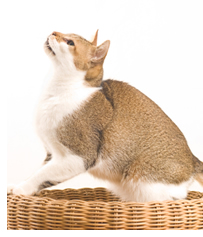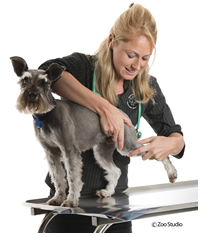
What is degenerative joint disease?
Degenerative joint disease, otherwise known as arthritis, is inflammation of the joints. When arthritis occurs, the cartilage lining of the joint wears down, resulting in inflammation, swelling and pain. The cartilage lining can wear down because of disease, poor structure or development (e.g. hip dysplasia), unusual gait, conformation or excessive weight gain.
Symptoms of arthritis
- Stiffness or slowness when getting up or down, or after resting
- Difficulty going up or down stairs or for cats unwillingness to jump
- Reduction in activity or a reluctance to exercise
- Dragging back legs, worn toenails or reluctance to groom in cats
- Limping.
- Licking or biting of joints.
- Difficulty in rising from a resting position.
- Difficulty in climbing stairs.
- Personality change (less happy and playful or sometimes aggressive and irritable).
Often, arthritis pain is worse after resting, vigorous exercise, or cold weather. Talk to your local Greencross Vet to determine if your pet has arthritis.
Managing Arthritis
Arthritis cannot be cured. The key to controlling the pain associated with arthritis is managing the inflammation within the joints. The added benefit is that with proper management, progression can be slowed.
To manage the inflammation within the joints, Greencross Vets focuses on a multipoint plan:
Weight control
Weight control is extremely important when managing the symptoms and minimising the progression of arthritis. Excess weight puts additional pressure on already affected joints. Calorie-restricted diets and gentle exercise to maintain ideal (low end of normal) body weight are essential for animals with arthritis. We also recommend this for animals predisposed or at risk of arthritis..
Gentle and appropriate exercise
Walking and swimming are the best forms of exercise for dogs with arthritis. The appropriate duration of exercise depends on the individual pet. Regular short bouts of exercise are better than occasional longer bouts.
Omega-3 rich diet
Omega-3 fatty acids help block the inflammation around joints that causes pain. They also suppress the activity of an enzyme that causes cartilage damage, thus slowing the progression of arthritis. Omega-3 is found in certain veterinary diets at appropriate doses for managing arthritis
Joint cartilage protective medications
Many veterinary products increase joint fluid production and increase blood supply to joint surfaces. The use of pentosan polysulfate has been proven to slow the progression of arthritis and help control the pain associated with the disease.
Neutraceuticals such as Green Lipped Mussel
Nutraceuticals such as green-lipped mussels have also shown good results in assisting dogs with arthritis.
These products contain chondroitin and/or glucosamine, which are the ‘building blocks’ of cartilage. Supplying inflamed joints with these ‘building blocks’ allows for the constant production of healthy joint cartilage, which, in turn, assists the joints in reducing inflammation and, thus, pain.
Acupuncture
Acupuncture can be administered by specially trained veterinarians. It often provides excellent results for arthritic patients and is free from side effects and drugs.
Prescription Joint Diet
Many prescription joint diets for dogs and cats have been shown to alleviate discomfort and improve the functioning of diseased joints. Some of these diets also combine joint support with weight loss. Please see your local Greencross Vet for more information.
Anti-inflammatory medications
Anti-inflammatory medications can also be used to help control the pain associated with arthritis and are often used at the forefront of arthritic patients. They are best used to control acute pain and as an adjunct to the management of chronic pain. Anti-inflammatories will not slow the progression of the disease and are best used in combination with other modes of treatment.
Advanced cell therapy
Stem cell therapies can be utilised when fatty tissue is inserted into arthritic joints under anaesthetic. While quite new, these therapies have been shown to have an anti-inflammatory effect on arthritic joints.
There are several effective treatment options available for arthritis, and it need not be a debilitating disease of old age. If you suspect your pet may be suffering from joint stiffness or pain, speak to your veterinarian about starting an arthritis management program that best suits your pet’s needs.

 Greencross Vets
Greencross Vets 











